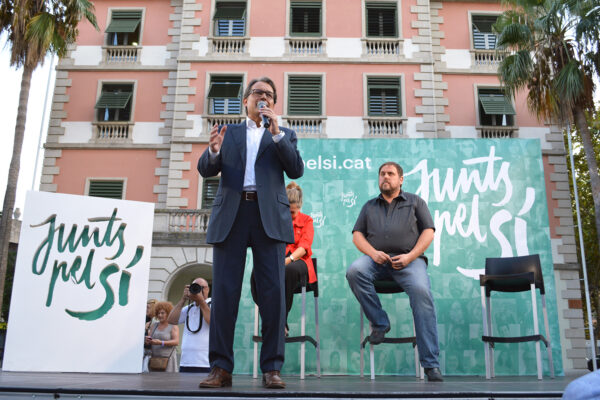
Catalonia’s ruling left-right coalition looks close to collapsing.
The northeastern region of Spain is governed by three parties: the center-right Catalan European Democratic Party and the pro-independence Republican Left, united in the electoral alliance Together for Yes, plus the far-left Popular Unity Candidacy (CUP).
The marriage has been one of convenience. Little unites the parties except their shared desire to break away from Spain.
The left has been kept on board with more generous public spending and the promise of a referendum, but they still mistrust the liberals, who only recently converted to the independence cause.
The right, for its part, still doubts the left — the inexperienced CUP in particular — is willing to make the sort of compromises that are necessary in government.
Both were confirmed in their suspicions this week.
Corruption scandal
The Republican Left and CUP unexpectedly sided with the opposition and voted to implicate the entire Democratic Party, formerly called Democratic Convergence of Catalonia, in a corruption scandal involving the funneling of public funds through a Barcelona concert hall.
The party allegedly used the money to finance its election campaigns. The regional government is now in a position to join the lawsuit as an injured party.
The CUP forced the issue by demanding a vote in parliament. The liberals attempted to shield their predecessors but were overruled by a majority of their own coalition partners and the opposition.
Independence campaign
Separately, the Republican Left has started campaigning for a “yes” vote in an independence referendum, despite Carles Puigdemont, the regional president, not having announced one yet.
Puigdemont, like previous center-right leaders, has fudged the issue, alternating between threatening unilateral secession and urging dialogue with Madrid.
He is expected to call a referendum this summer, but not before making a final attempt to secure the central government’s blessing.
It has so far maintained that an independence referendum would be illegal under the Spanish constitution.
Puigdemont’s liberals are wary. They have radicalized their position from autonomy to peaceful secession, but they are desperate to keep an independent Catalonia in the European Union and NATO. Unilateral secession would jeopardize membership of both.
The Republican Left, by contrast, seeks independence at any cost while the CUP wants to leave the EU and NATO anyway.
Left-wing pact
Regional elections aren’t due until 2019, but the left may not want to wait that long.
Puigdemont’s Democrats are down to 15 percent support in the polls whereas the combined left is up. They could almost certainly find a majority in combination with the mainstream Socialist Party and the far-left Un País en Comú, which includes Podemos.
The trouble is, those two parties oppose independence.
Un País en Comú (“A Country in Common”) could perhaps be persuaded to support a referendum if the polls show the separatists losing. The Socialists are less likely to take that chance.
The alternative is a coalition between the Democrats, the liberal Ciudadanos, the Socialists and the conservative People’s Party. That would require the former to change their minds — again — on independence, though.
